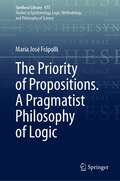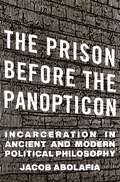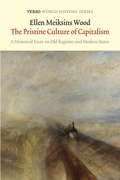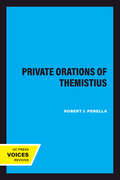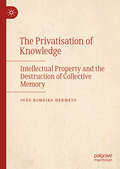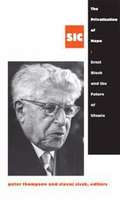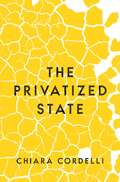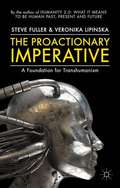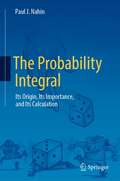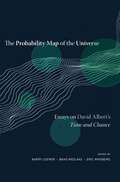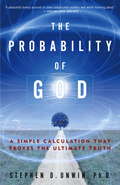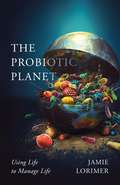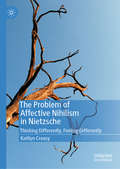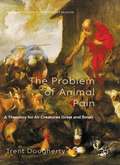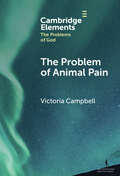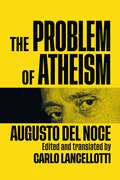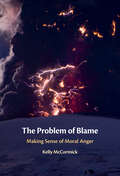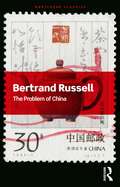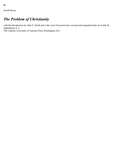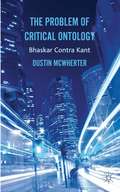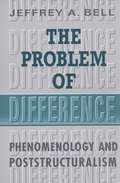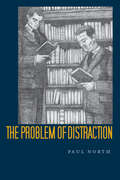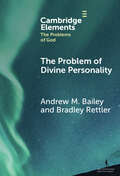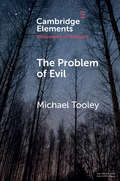- Table View
- List View
The Priority of Propositions. A Pragmatist Philosophy of Logic (Synthese Library #475)
by María José FrápolliThis monograph is a defence of the Fregean take on logic. The author argues that Frege´s projects, in logic and philosophy of language, are essentially connected and that the formalist shift produced by the work of Peano, Boole and Schroeder and continued by Hilbert and Tarski is completely alien to Frege's approach in the Begriffsschrift. A central thesis of the book is that judgeable contents, i.e. propositions, are the primary bearers of logical properties, which makes logic embedded in our conceptual system. This approach allows coherent and correct definitions of logical constants, logical consequence, and truth and connects their use to the practices of rational agents in science and everyday life.
The Prison House of the Circuit: Politics of Control from Analog to Digital
by Jeremy Packer Joshua Reeves Alexander Monea Paula Nuñez de Villavicencio Kathleen Oswald Kate MaddalenaHas society ceded its self-governance to technogovernance?The Prison House of the Circuit presents a history of digital media using circuits and circuitry to understand how power operates in the contemporary era. Through the conceptual vocabulary of the circuit, it offers a provocative model for thinking about governance and media.The authors, writing as a collective, provide a model for collective research and a genealogical framework that interrogates the rise of digital society through the lens of Foucault&’s ideas of governance, circulation, and power. The book includes five in-depth case studies investigating the transition from analog media to electronic and digital forms: military telegraphy and human–machine incorporation, the establishment of national electronic biopolitical governance in World War I, media as the means of extending spatial and temporal policing, automobility as the mechanism uniting mobility and media, and visual augmentation from Middle Ages spectacles to digital heads-up displays. The Prison House of the Circuit ultimately demonstrates how contemporary media came to create frictionless circulation to maximize control, efficacy, and state power.
The Prison before the Panopticon: Incarceration in Ancient and Modern Political Philosophy
by Jacob AbolafiaA pioneering history of incarceration in Western political thought.The prison as we know it is a relatively new institution, established on a large scale in Europe and the United States only during the Enlightenment. Ideas and arguments about penal incarceration, however, long predate its widespread acceptance as a practice. The Prison before the Panopticon argues that debates over imprisonment are as old as Western political philosophy itself. This groundbreaking study examines the role of the prison in the history of political thought, detailing the philosophy of incarceration as it developed from Demosthenes, Plato, and Philo to Thomas More, Thomas Hobbes, and Jeremy Bentham.Jacob Abolafia emphasizes two major themes that reappear in philosophical writing about the prison. The first is the paradox of popular authorization. This is the problem of how to justify imprisonment in light of political and theoretical commitments to freedom and equality. The second theme is the promise of rehabilitation. Plato and his followers insist that imprisonment should reform the prisoner and have tried to explain in detail how incarceration could have that effect.While drawing on current historical scholarship to carefully situate each thinker in the culture and penal practices of his own time and place, Abolafia also reveals the surprisingly deep and persistent influence of classical antiquity on modern theories of crime and punishment. The Prison before the Panopticon is a valuable resource not only about the legitimacy of the prison in an age of mass incarceration but also about the philosophical justifications for penal alternatives like restorative justice.
The Pristine Culture of Capitalism
by Ellen Meiksins WoodA historical essay on old regimes and modern states In this lively and wide-ranging book, Ellen Meiksins Wood argues that what is supposed to have epitomized bourgeois modernity, especially the emergence of a "modern" state and political culture in Continental Europe, signaled the persistence of pre-capitalist social property relations. Conversely, the absence of a "modern" state and political discourse in England testified to the presence of a well-developed capitalism. The fundamental flaws in the British economy are not just the symptoms of arrested development but the contradictions of the capitalist system itself. Britain today, Wood maintains, is the most thoroughly capitalist culture in Europe.
The Private Orations of Themistius (Transformation of the Classical Heritage #29)
by Robert J. PenellaThemistius was a philosopher, a prominent Constantinopolitan senator, and an adviser to Roman emperors during the fourth century A.D. In this first translation of Themistius's private orations to be published in English, Robert J. Penella makes accessible texts that shed significant light on the culture of Constantinople and, more generally, the eastern Roman empire during the fourth century. The sixteen speeches translated here are equipped with ample annotations and an informative introduction, making them a valuable resource on the late antique period, as well as on Greek intellectual history and oratory.In Themistius's public orations, he played the role of imperial panegyrist, but in the "private" or unofficial orations presented here, the senator concerns himself with apologetics, rhetorical and philosophical programs, material of autobiographical interest, and ethical themes. The speeches are valuable as evidence for the political, social, philosophical, religious, and literary history of fourth century Byzantium, and as examples of pagan ideology and eloquence in the newly Christianized court. Themistius argues, among other things, that the philosopher should be involved in public affairs, that the lessons of philosophy should be broadcast to the masses, and that it is appropriate for the philosopher to be an effective orator in order to circulate his teachings.
The Privatisation of Knowledge: Intellectual Property and the Destruction of Collective Memory
by João Romeiro HermetoThis book argues that the private appropriation of human knowledge through intellectual property gives rise to power relations, which colonise the collective mind as well as individual minds. In so doing these power relations destroy the social fabric necessary for producing and reproducing knowledge.Besides the direct impact on political-economic relations, the privatisation of knowledge distresses collective memory. The book concludes that although individual, social, and collective memories can only exist in tandem, the atrophy of the social and collective dimensions of the mind results in a sort of social dementia.The Privatisation of Knowledge is essential reading for all scholars and researchers of economic philosophy. It is also ideal for researchers of Marxian social science.
The Privatization of Hope: Ernst Bloch and the Future of Utopia, SIC 8
by Peter Thompson Slavoj ZizekThe concept of hope is central to the work of the German philosopher Ernst Bloch (1885-1977), especially in his magnum opus, The Principle of Hope (1959). The "speculative materialism" that he first developed in the 1930s asserts a commitment to humanity's potential that continued through his later work. In The Privatization of Hope, leading thinkers in utopian studies explore the insights that Bloch's ideas provide in understanding the present. Mired in the excesses and disaffections of contemporary capitalist society, hope in the Blochian sense has become atomized, desocialized, and privatized. From myriad perspectives, the contributors clearly delineate the renewed value of Bloch's theories in this age of hopelessness. Bringing Bloch's "ontology of Not Yet Being" into conversation with twenty-first-century concerns, this collection is intended to help revive and revitalize philosophy's commitment to the generative force of hope.Contributors. Roland Boer, Frances Daly, Henk de Berg, Vincent Geoghegan, Wayne Hudson, Ruth Levitas, David Miller, Catherine Moir, Caitríona Ní Dhúill, Welf Schröter, Johan Siebers, Peter Thompson, Francesca Vidal, Rainer Ernst Zimmermann, Slavoj Žižek
The Privatized State
by Chiara CordelliWhy government outsourcing of public powers is making us less freeMany governmental functions today—from the management of prisons and welfare offices to warfare and financial regulation—are outsourced to private entities. Education and health care are funded in part through private philanthropy rather than taxation. Can a privatized government rule legitimately? The Privatized State argues that it cannot.In this boldly provocative book, Chiara Cordelli argues that privatization constitutes a regression to a precivil condition—what philosophers centuries ago called "a state of nature." Developing a compelling case for the democratic state and its administrative apparatus, she shows how privatization reproduces the very same defects that Enlightenment thinkers attributed to the precivil condition, and which only properly constituted political institutions can overcome—defects such as provisional justice, undue dependence, and unfreedom. Cordelli advocates for constitutional limits on privatization and a more democratic system of public administration, and lays out the central responsibilities of private actors in contexts where governance is already extensively privatized. Charting a way forward, she presents a new conceptual account of political representation and novel philosophical theories of democratic authority and legitimate lawmaking.The Privatized State shows how privatization undermines the very reason political institutions exist in the first place, and advocates for a new way of administering public affairs that is more democratic and just.
The Proactionary Imperative
by Steve FullerThe Proactionary Imperative debates the concept of transforming human nature, including such thorny topics as humanity's privilege as a species, our capacity to 'play God', the idea that we might treat our genes as a capital investment, eugenics and what it might mean to be 'human' in the context of risky scientific and technological interventions.
The Probability Integral: Its Origin, Its Importance, and Its Calculation
by Paul J. NahinThis book tells the story of the probability integral, the approaches to analyzing it throughout history, and the many areas of science where it arises. The so-called probability integral, the integral over the real line of a Gaussian function, occurs ubiquitously in mathematics, physics, engineering and probability theory. Stubbornly resistant to the undergraduate toolkit for handling integrals, calculating its value and investigating its properties occupied such mathematical luminaries as De Moivre, Laplace, Poisson, and Liouville. This book introduces the probability integral, puts it into a historical context, and describes the different approaches throughout history to evaluate and analyze it. The author also takes entertaining diversions into areas of math, science, and engineering where the probability integral arises: as well as being indispensable to probability theory and statistics, it also shows up naturally in thermodynamics and signal processing. Designed to be accessible to anyone at the undergraduate level and above, this book will appeal to anyone interested in integration techniques, as well as historians of math, science, and statistics.
The Probability Map of the Universe: Essays on David Albert’s <i>Time and Chance</i>
by Barry Loewer, Brad Weslake, and Eric WinsbergPhilosophers debate the ideas and implications of one of the most important contemporary works in the philosophy of science, David Albert’s Time and Chance.In the twenty-odd years since its publication, David Albert’s Time and Chance has been recognized as one of the most significant contemporary contributions to the philosophy of science. Here, philosophers and physicists explore the implications of Albert’s arguments and debate his solutions to some of the most intractable problems in theoretical physics.Albert has attempted to make sense of the tension between our best scientific pictures of the fundamental physical structure of the world and our everyday empirical experience of that world. In particular, he is concerned with problems arising from causality and the direction of time: defying common sense, almost all our basic scientific ideas suggest that whatever can happen can just as naturally happen in reverse. Focusing on Newtonian mechanics, Albert provides a systematic account of the temporal irreversibility of the Second Law of Thermodynamics, of the asymmetries in our epistemic access to the past and the future, and of our conviction that by acting now we can affect the future but not the past. He also generalizes the Newtonian picture to the quantum-mechanical case and suggests a deep potential connection between the problem of the direction of time and the quantum-mechanical measurement problem.The essays included in The Probability Map of the Universe develop, explore, and critique this account, while Albert himself replies. The result is an insightful discussion of the foundations of statistical mechanics and its relation to cosmology, the direction of time, and the metaphysical nature of laws and objective probability.
The Probability of God: A Simple Calculation That Proves the Ultimate Truth
by Dr. Stephen D. UnwinDoes God exist?This is probably the most debated question in the history of mankind. Scholars, scientists, and philosophers have spent their lifetimes trying to prove or disprove the existence of God, only to have their theories crucified by other scholars, scientists, and philosophers. Where the debate breaks down is in the ambiguities and colloquialisms of language. But, by using a universal, unambiguous language—namely, mathematics—can this question finally be answered definitively? That’s what Dr. Stephen Unwin attempts to do in this riveting, accessible, and witty book, The Probability of God.At its core, this groundbreaking book reveals how a math equation developed more than 200 years ago by noted European philosopher Thomas Bayes can be used to calculate the probability that God exists. The equation itself is much more complicated than a simple coin toss (heads, He’s up there running the show; tails, He’s not). Yet Dr. Unwin writes with a clarity that makes his mathematical proof easy for even the nonmathematician to understand and a verve that makes his book a delight to read. Leading you carefully through each step in his argument, he demonstrates in the end that God does indeed exist.Whether you’re a devout believer and agree with Dr. Unwin’s proof or are unsure about all things divine, you will find this provocative book enlightening and engaging.
The Probiotic Planet: Using Life to Manage Life (Posthumanities #59)
by Jamie LorimerAssesses a promising new approach to restoring the health of our bodies and our planet Most of us are familiar with probiotics added to milk or yogurt to improve gastrointestinal health. In fact, the term refers to any intervention in which life is used to manage life—from the microscopic, like consuming fermented food to improve gut health, to macro approaches such as biological pest control and natural flood management. In this ambitious and original work, Jamie Lorimer offers a sweeping overview of diverse probiotic approaches and an insightful critique of their promise and limitations. During our current epoch—the Anthropocene—human activity has been the dominant influence on climate and the environment, leading to the loss of ecological abundance, diversity, and functionality. Lorimer describes cases in which scientists and managers are working with biological processes to improve human, environmental, and even planetary health, pursuing strategies that stand in contrast to the &“antibiotic approach&”: Big Pharma, extreme hygiene, and industrial agriculture. The Probiotic Planet focuses on two forms of &“rewilding&” occurring on vastly different scales. The first is the use of keystone species like wolves and beavers as part of landscape restoration. The second is the introduction of hookworms into human hosts to treat autoimmune disorders. In both cases, the goal is to improve environmental health, whether the environment being managed is planetary or human. Lorimer argues that, all too often, such interventions are viewed in isolation, and he calls for a rethinking of artificial barriers between science and policy. He also describes the stark and unequal geographies of the use of probiotic approaches and examines why these patterns exist. The author&’s preface provides a thoughtful discussion of the COVID-19 pandemic as it relates to the probiotic approach. Informed by deep engagement with microbiology, immunology, ecology, and conservation biology as well as food, agriculture, and waste management, The Probiotic Planet offers nothing less than a new paradigm for collaboration between the policy realm and the natural sciences.
The Problem of Affective Nihilism in Nietzsche: Thinking Differently, Feeling Differently
by Kaitlyn CreasyNietzsche is perhaps best known for his diagnosis of the problem of nihilism. Though his elaborations on this diagnosis often include descriptions of certain beliefs characteristic of the nihilist (such as beliefs in the meaninglessness or worthlessness of existence), he just as frequently specifies a variety of affective symptoms experienced by the nihilist that weaken their will and diminish their agency. This affective dimension to nihilism, however, remains drastically underexplored. In this book, Kaitlyn Creasy offers a comprehensive account of affective nihilism that draws on Nietzsche’s drive psychology, especially his reflections on affects and their transformative potential. After exploring Nietzsche’s account of affectivity (illuminating especially the transpersonal nature of affect in Nietzsche’s thought) and the phenomenon of affective nihilism, Creasy argues that affective nihilism might be overcome by employing a variety of Nietzschean strategies: experimentation, self-narration, and self-genealogy.
The Problem of Animal Pain
by Trent DoughertyAnimal suffering constitutes perhaps the greatest challenge to rational belief in the existence of God. Considerations that render human suffering theologically intelligible seem inapplicable to animal suffering. In this book, Dougherty defends radical possibilities for animal afterlife that allow a soul-making theodicy to apply to their case.
The Problem of Animal Pain (Elements in the Problems of God)
by Victoria CampbellIn this Element atheists cite animal pain as compelling evidence against the existence of the loving God portrayed in the Judeo-Christian Bible. William Rowe, Paul Draper, Richard Dawkins and others claim widespread unnecessary suffering exists in nature and challenge theism with the Evidential Problem of Natural Evil. This Element engages the scientific literature in order to evaluate the validity of those claims and offers a theodicy of God's providential care for animals through natural pain mitigating processes.
The Problem of Atheism (McGill-Queen's Studies in the History of Ideas #84)
by Augusto Del NoceIn 1964, Augusto Del Noce assembled in a book some of his best works on Marxism, atheism, and the history of modern philosophy. The result was Il problema dell’ateismo, which he always regarded as foundational to his way of thinking. The book remains his best-known work and is still in print in Italy almost sixty years later.The Problem of Atheism offers the first English translation of this landmark book, one of the earliest works to recognize the new secularizing trends in Western culture following World War II. Del Noce situates atheism historically, reconstructing its philosophical trajectory through European modernity. Documenting the author’s entire intellectual experience, these essays explore the birth of modern philosophy, reckon with the great European crisis of 1917 to 1945 and the Cold War that followed, and mine the opposition between Marxism and the rise of the affluent society. The result is rich with premonitions of the cultural landscape that would take shape throughout the 1960s and the decades that followed.Proving its English translation to be long overdue, The Problem of Atheism remains relevant to contemporary debates about secularization, political theology, and modernity.
The Problem of Blame: Making Sense of Moral Anger
by Kelly McCormickThis book makes a case for the permissibility of reactive blame – the angry, harmful variety. Blame is a thorny philosophical problem, as it is notoriously difficult to specify the conditions under which an agent is deserving of blame, is deserving of blame in the basic sense, and furthermore why this is so. Kelly McCormick argues that sharpening the focus to reactive, angry blame can both show us how best to characterize the problem itself, and suggest a possible solution to it, because even reactive blame is both valuable and deserved in the basic sense. Finally, McCormick shows how, despite the many facets of the dark side of blame, adopting an explicitly victim-centered approach highlights a powerful argument from empathy for retaining reactive blame and its attendant attitudes and practices.
The Problem of China (Routledge Classics)
by Bertrand Russell'China, by her resources and her population, is capable of being the greatest power in the world after the United States.' Bertrand Russell, The Problem of China In 1920 the philosopher Bertrand Russell spent a year in China as Professor of Philosophy at the University of Beijing (then Peking), where his lectures on mathematical logic enthralled students and listeners, including Mao Tse Tung, who attended some of Russell’s talks. Written at a time when China was largely regarded by the West as backward and weak, The Problem of China sees Russell rise above the prejudices of his era and presciently assess China's past, present and future. Russell brings his analytical and insightful eye to bear on some fundamental aspects of China’s history and politics, cautioning China against adopting a purely Western model of social and economic development, which he regarded as characterized by a combination of greed and militarism. Beginning with an overview of nineteenth-century Chinese history and considering China's relations with Japan and Russia, Russell then contrasts Chinese civilization with Western. He devotes a fascinating chapter to the character of the Chinese, which he argues is complex but ultimately defined by a ‘pacific temper’. With uncanny foresight, Russell predicts China’s resurgence, but only if it is able to establish an orderly government, promote industrial development under Chinese control and foster the spread of education. This Routledge Classics edition includes a new introduction by Bernard Linsky.
The Problem of Christianity
by Josiah RoyceJosian Royce's late masterpiece, The Problem of Christianity, is based on a series of lectures he delivered at Manchester College, Oxford, in 1913. It presents his philosophical interpretation of Christianity's fundamental ideas―community, sin, atonement, and saving grace; shows their relevance to the current confluence of world religions; and grounds his position upon a personal transformation into genuine loyalty toward the community of the entire human family. <p><p>The Problem opens up a mine of surprising treasures while its prophetic voice speaks to contemporary issues and current movements in ecumenics and inter-religious dialogue. Frank M. Oppenheim's new introduction highlights its relevance to some of the pressing problems of the new century.
The Problem of Critical Ontology
by Dustin McwherterDustin McWherter defends the possibility of critical ontology by pitting Roy Bhaskar's attempt to rehabilitate ontology in the philosophy of science against Kant's attempt to replace traditional ontology with an account of cognitive experience.
The Problem of Difference
by Jeffrey A. BellBeginning with Plato and Aristotle, philosophers throughout history have built their theories around the problem of reconciling a fundamental distinction, as for example, Plato's distinction between knowledge (reality) and opinion (appearance), Descarte's mind/body distinction, and Kant's a priori/a posteriori distinction. This 'problem of difference' is a classic theme in philosophy, and one that has taken especially intriguing turns in recent decades. Jeffrey A. Bell here presents a finely constructed survey of the contemporary continental philosophers, focusing on how they have dealt with the problem of difference. Bell's work centres around three key figures - Husserl, Merleau-Ponty, and Deleuze. He also considers the positions of such thinkers as Foucault, Derrida, and Rorty, who have called for an end to the traditional response to the problem of difference - an end to the search for any ultimate foundations on which our varied and different experiences of the world might be based - and thus, in effect, an end to traditional philosophy. In clarifying the relationship between phenomenology and poststructuralism, Bell analyses the role of paradox in both traditions, in particular the role it plays in accounting for difference. Not only philosophers, but also teachers and students in the area of comparative literary they will benefit from this book.
The Problem of Distraction
by Paul NorthWe live in an age of distraction. Contemporary analyses of culture, politics, techno-science, and psychology insist on this. They often suggest remedies for it, or ways to capitalize on it. Yet they almost never investigate the meaning and history of distraction itself. This book corrects this lack of attention. It inquires into the effects of distraction, defined not as the opposite of attention, but as truly discontinuous intellect. Human being has to be reconceived, according to this argument, not as quintessentially thought-bearing, but as subject to repeated, causeless blackouts of mind. The Problem of Distraction presents the first genealogy of the concept from Aristotle to the largely forgotten, early twentieth-century efforts by Kafka, Heidegger, and Benjamin to revolutionize the humanities by means of distraction. Further, the book makes the case that our present troubles cannot be solved by recovering or enhancing attention. Not-always-thinking beings are beset by radical breaks in their experience, but in this way they are also receptive to what has not and cannot yet be called experience.
The Problem of Divine Personality (Elements in the Problems of God)
by Andrew M. Bailey Bradley RettlerThe main question of this Element is whether God has a personality. The authors show what the question means, why it matters, and that good sense can be made of an affirmative answer to it. A God with personality - complete with particular, sometimes peculiar, and even seemingly unexplainable druthers - is not at war with maximal perfection, nor is the idea irredeemably anthropomorphic. And the hypothesis of divine personality is fruitful, with substantive consequences that span philosophical theology. But problems arise here too, and new perspectives on inquiry itself. Our cosmos is blessed with weirdness aplenty. To come to know it is nothing less than to encounter a strange and untamed God.
The Problem of Evil (Elements in the Philosophy of Religion)
by Michael TooleyChapter 1 addresses some preliminary issues that it is important to think about in formulating arguments from evil. Chapter 2 is then concerned with the question of how an incompatibility argument from evil is best formulated, and with possible responses to such arguments. Chapter 3 then focuses on skeptical theism, and on the work that skeptical theists need to do if they are to defend their claim of having defeated incompatibility versions of the argument from evil. Finally, Chapter 4 discusses evidential arguments from evil, and four different kinds of evidential argument are set out and critically examined.
